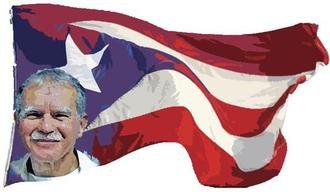Oscar López Rivera on U.S. colonialism
 The Caribbean island of Puerto Rico has been a colony since it was invaded by the U.S. in 1898. Puerto Ricans became U.S. citizens in 1917. It is the homeland of Oscar López Rivera, a leader in the struggle for Puerto Rican independence.
The Caribbean island of Puerto Rico has been a colony since it was invaded by the U.S. in 1898. Puerto Ricans became U.S. citizens in 1917. It is the homeland of Oscar López Rivera, a leader in the struggle for Puerto Rican independence.
López Rivera served 35 years in a U.S. federal prison, much of it in solitary confinement, for his active opposition to U.S. forceful authority over the island. He was pardoned by President Barack Obama in January and released in May.
While visiting the community of Las Monjas in San Juan on Oct. 18, after Hurricane Maria, López Rivera said in an interview with Democracy Now that the hurricane had been a devastating experience for him, primarily because one of the first things he noticed was gentrification.
“We can anticipate that a lot of communities, including the one here, will be displaced once it is beautified, embellished in the end, and probably gentrified. And once they can wipe out the residents, then they can do whatever they feel like doing here. We can see it in Ponce de León with Ciudadela, the buildings, the condominiums. Every part of Puerto Rico along the ocean, we can see gentrification taking place. Vieques and Culebra are probably the biggest targets now.”
He added that “gentrification means the displacement of Puerto Rico, of the working class. Foreigners coming into Puerto Rico who invest are having access to incentives that we don’t have access to. If a multimillionaire buys a condominium for $1.5 million or $2 million, he will not have to pay any taxes for 25 or 30 years. I have found a Puerto Rico with a very, very high unemployment rate, that seems to be in a desperate state, especially after the hurricane. …
“The financial institutions are going to move in; they will invest. They will buy out because the property is real cheap right now. I am surprised at the number of Puerto Ricans that are moving out of Puerto Rico still. But with the hurricane, it has increased.”
López Rivera sees the financial institutions, especially hedge funds, moving into Puerto Rico in force, knowing that what they invest now will be multiplied, reflecting how the colonizer treats the colonized.
Federal government response
“President Donald Trump has no sense of respect for Puerto Rico,” said López Rivera. “He has demonstrated it already by doing what he’s done. It is shameful for me to see a president tossing things to people who are suffering so much. The way that they came in with FEMA [the Federal Emergency Management Agency] and Homeland Security really reflect what colonialism is to Puerto Ricans. FEMA can come into Puerto Rico and dictate to Puerto Ricans what they have to do, and be totally disrespectful. Homeland Security comes in bearing arms. It’s almost incredible how they treat people, dealing with our situation. Treating us not like citizens, but like animals. From the medical side of Puerto Rico, we are being killed by neglect. It reflects the response of Donald Trump and the U.S. government to the crisis.”
He believes that most Puerto Ricans want to be Puerto Ricans. “Once we become annexed to or by the U.S., we will lose our national identity. I look at Hawaiian Natives and Native Americans on reservations as an example, losing their culture, their language, their lifestyles and their land. And that’s what’s going to happen to Puerto Rico. The Hawaiian Native population is about 9 percent. The overwhelming majority of prisoners are the Natives; the same thing with Alaska. Puerto Ricans will not be better off by annexation by the U.S. Once any nation or people lose their identity, they are a little dehumanized. This is the reality we are facing as Puerto Ricans.
“In the U.S. I have found young Puerto Ricans who really love P.R., and who want to do something for P.R. For me, Puerto Rico has to be the promised land of all Puerto Ricans, wherever we are,” added López Rivera.

